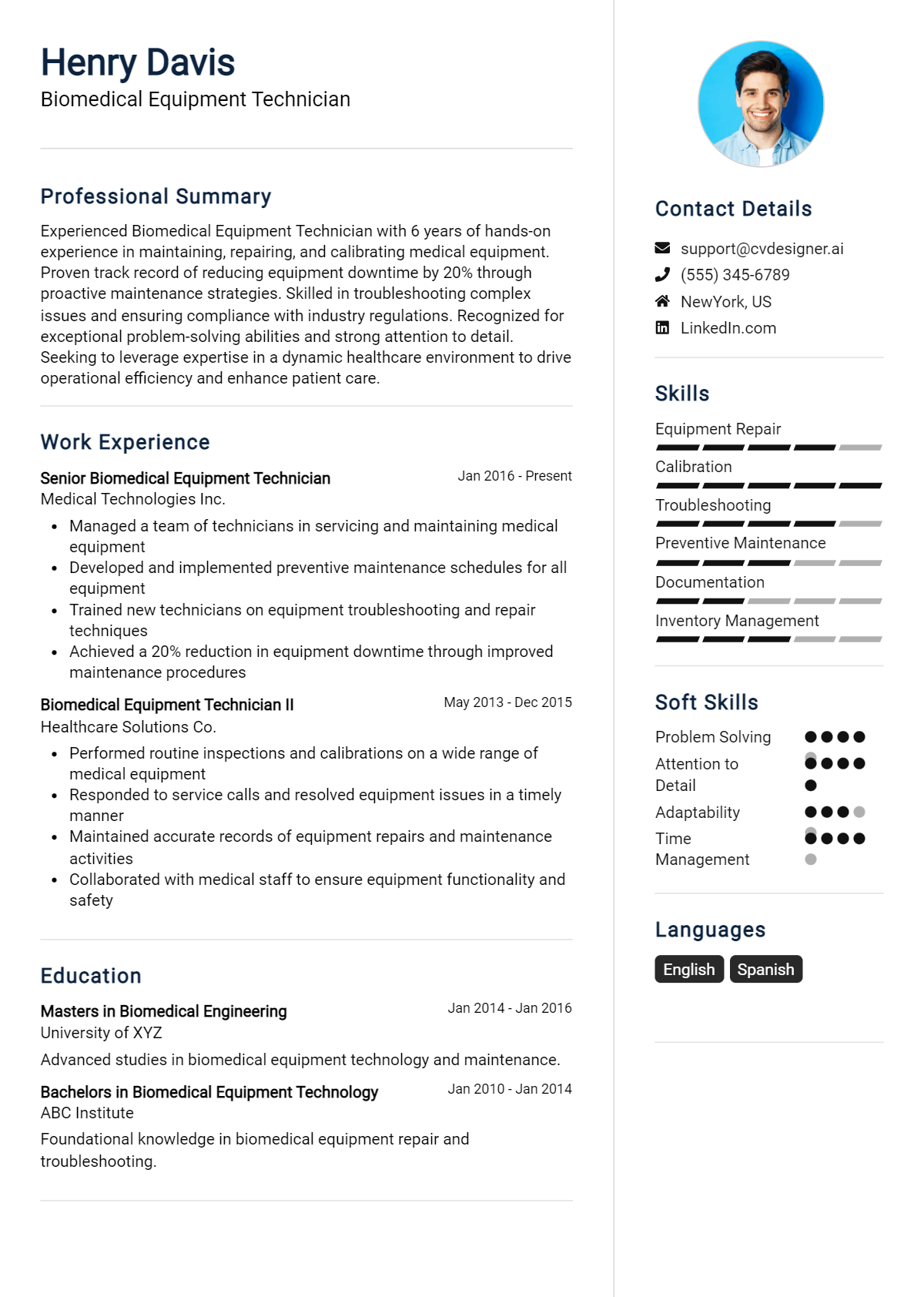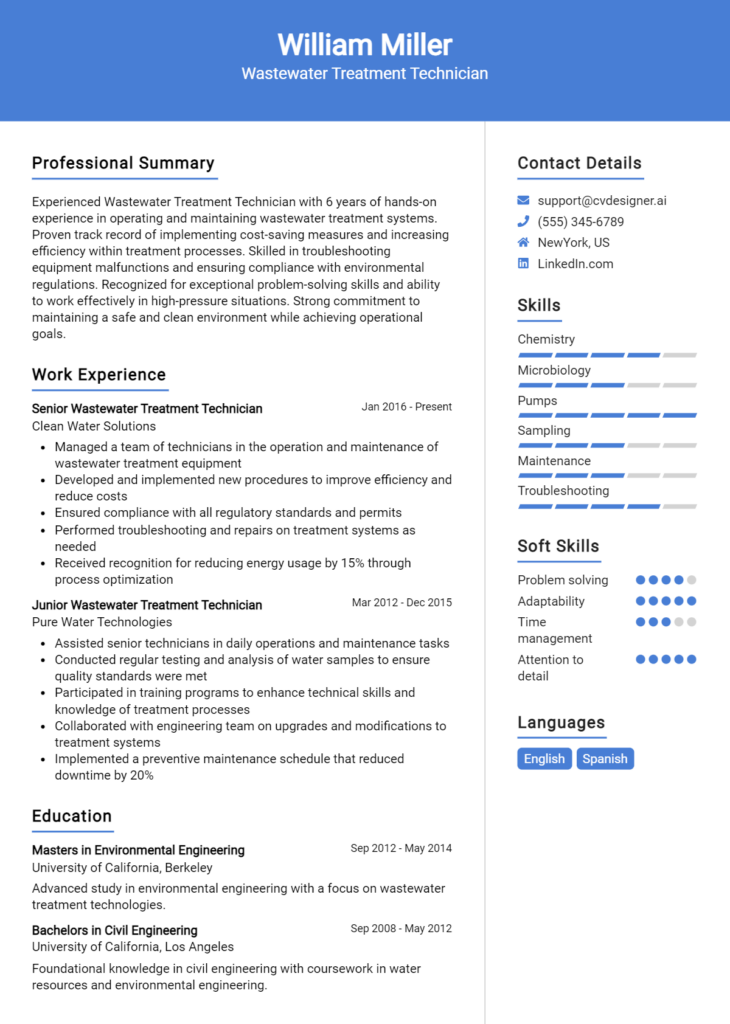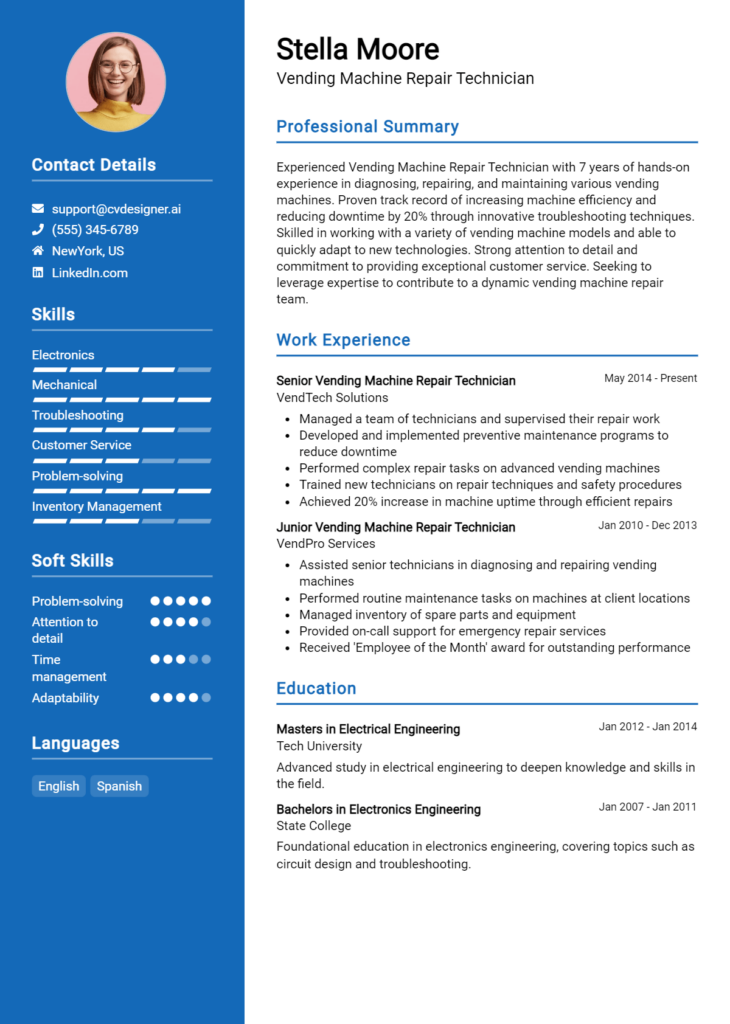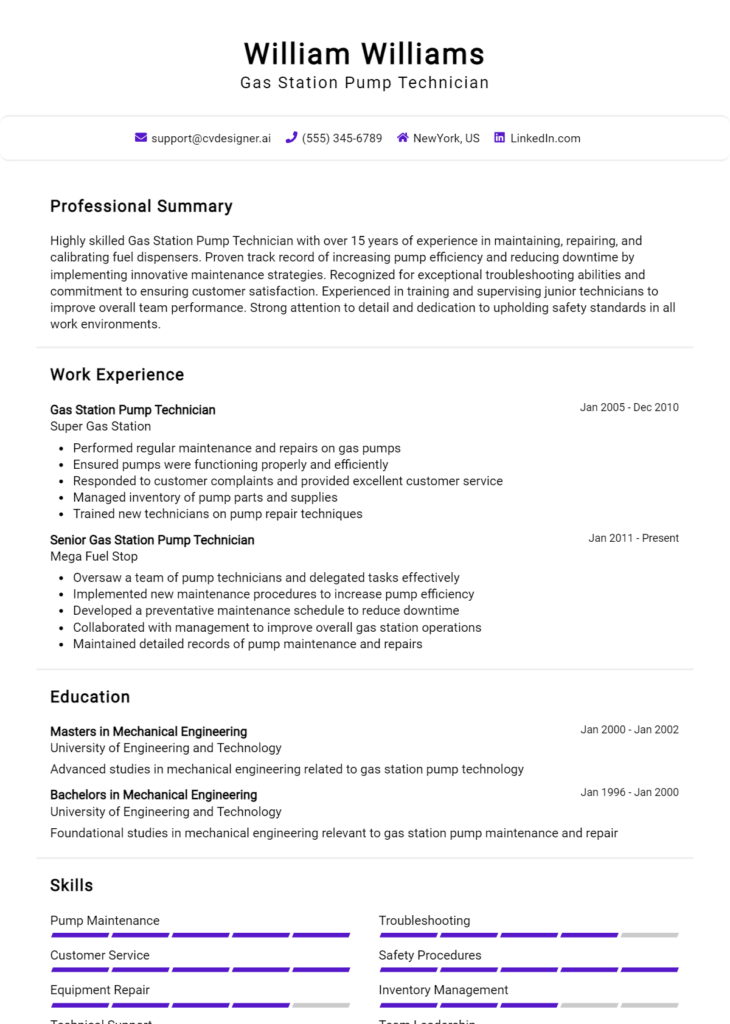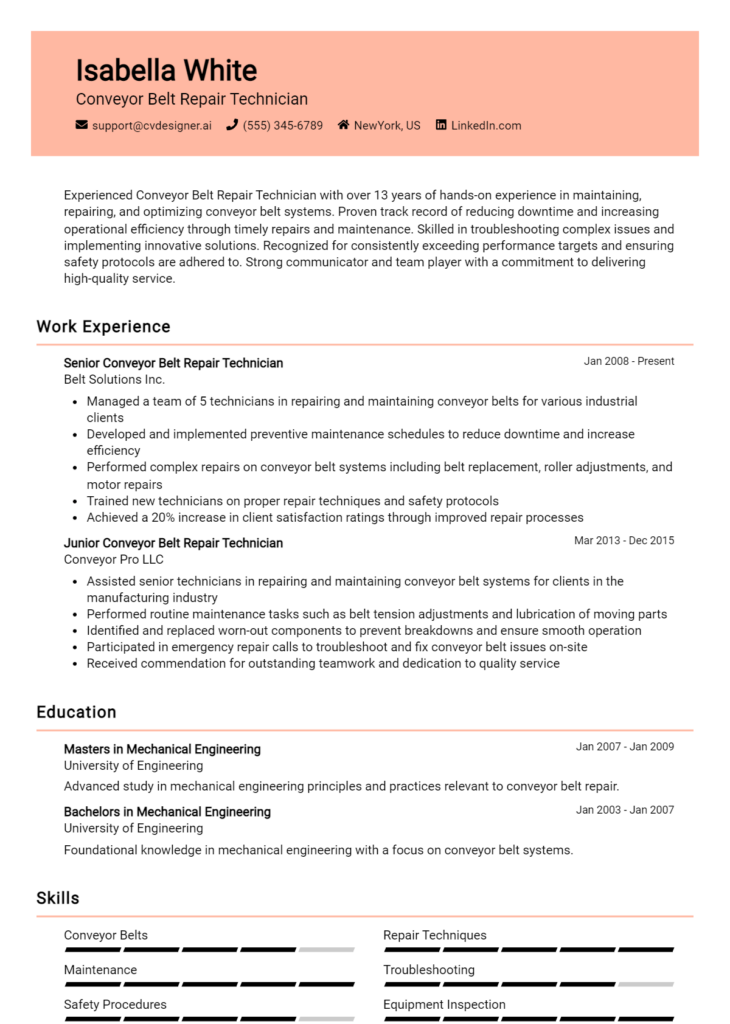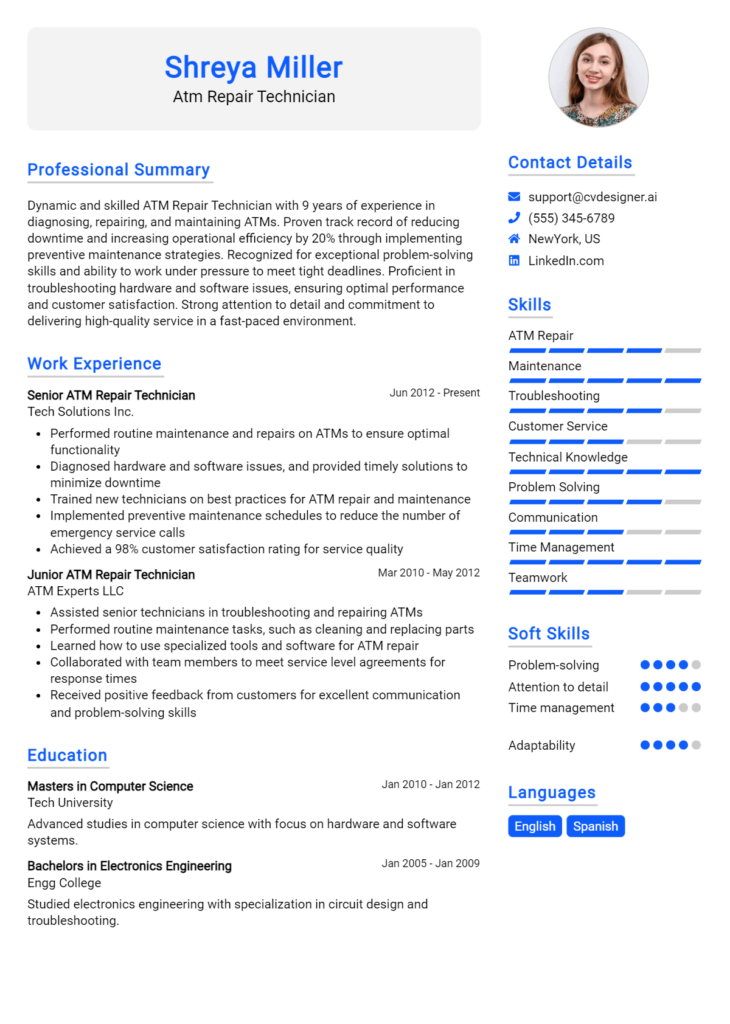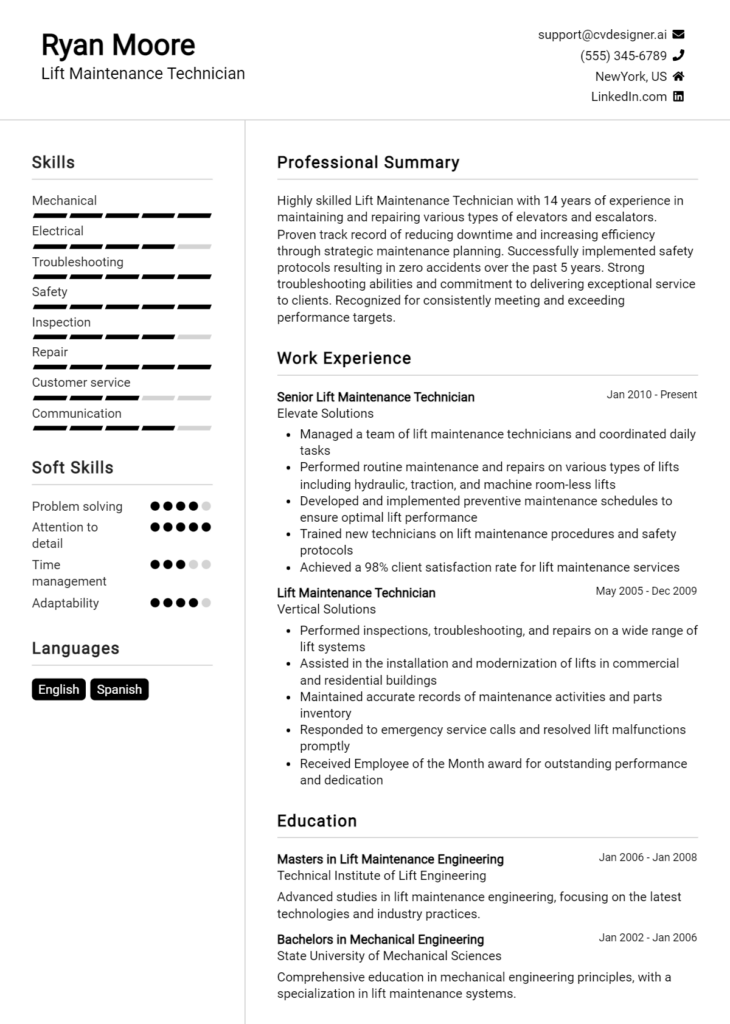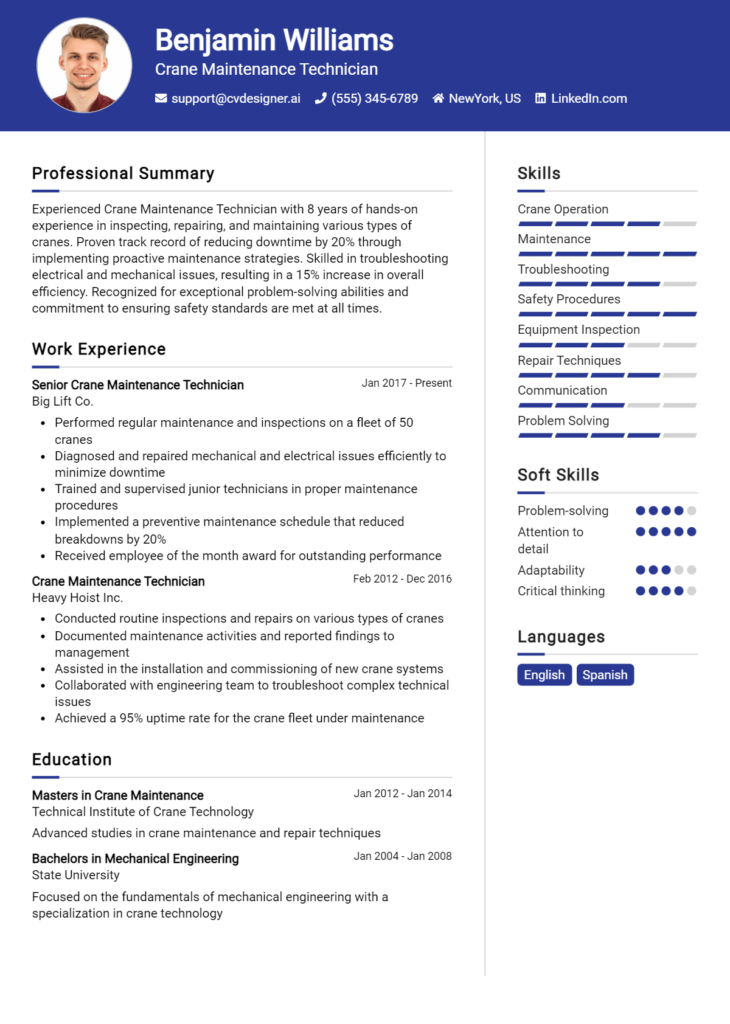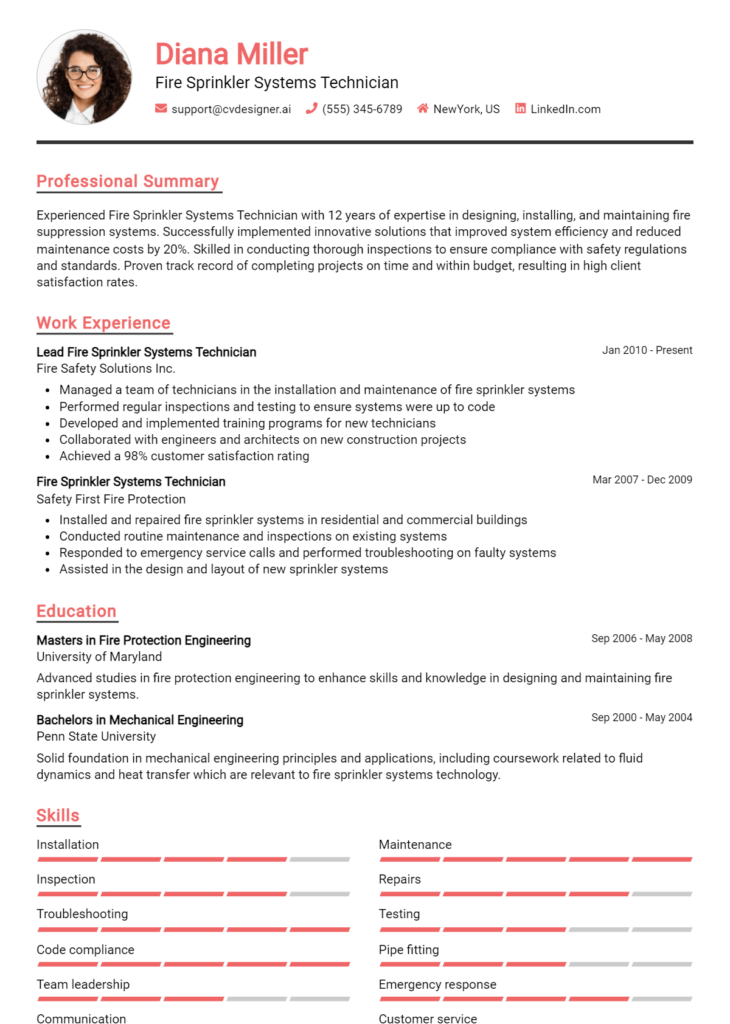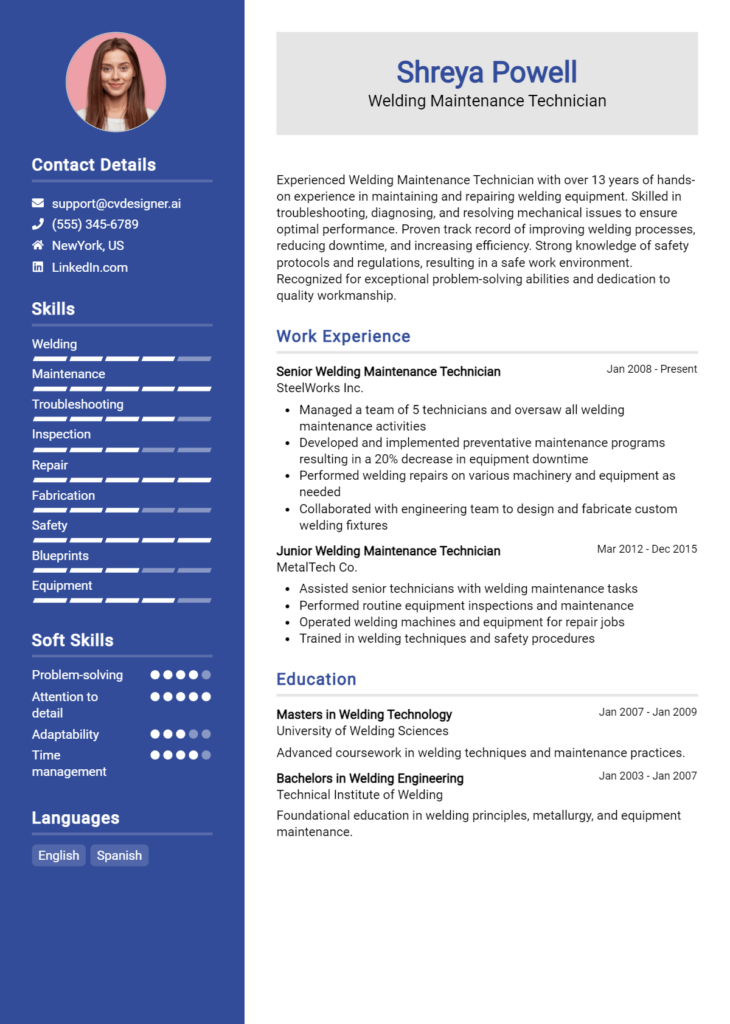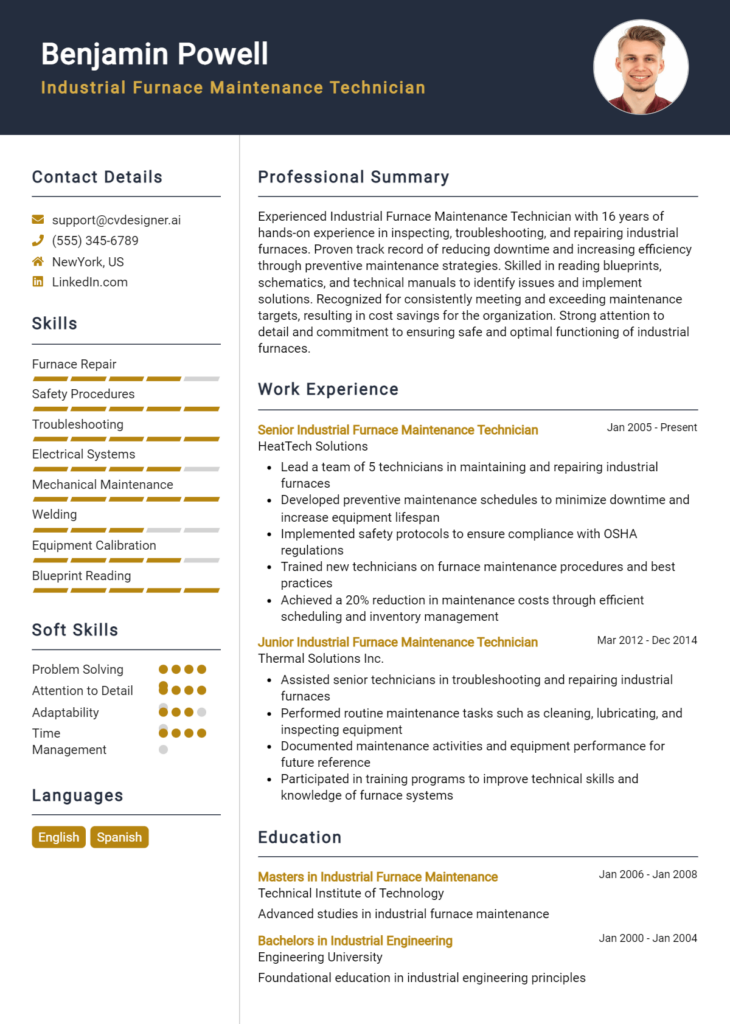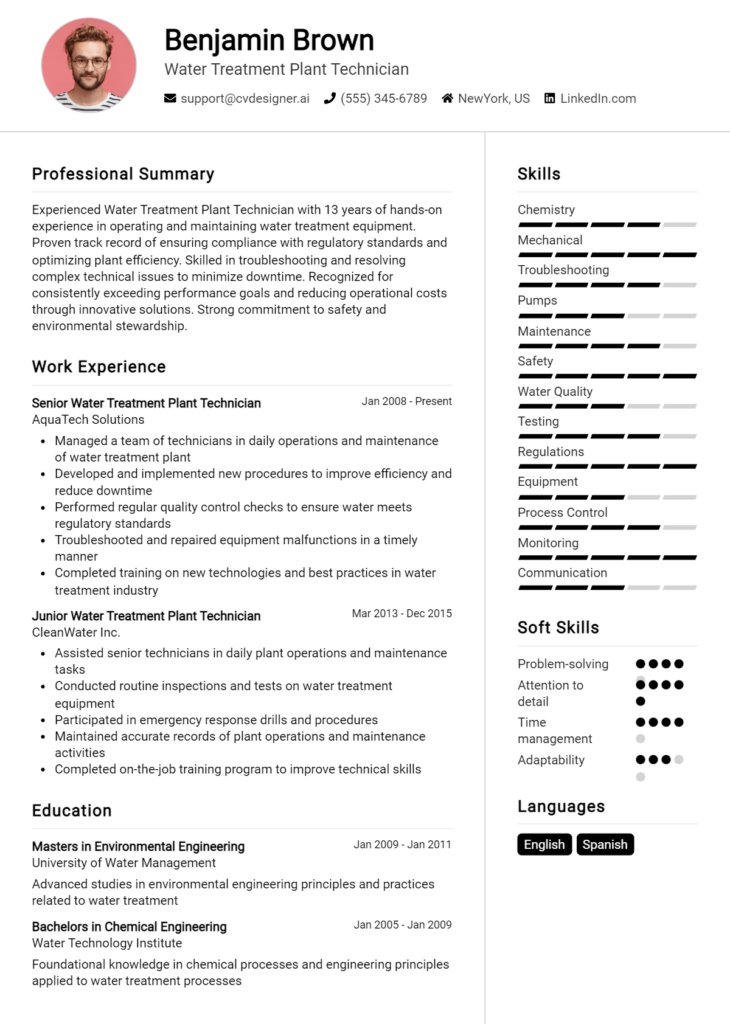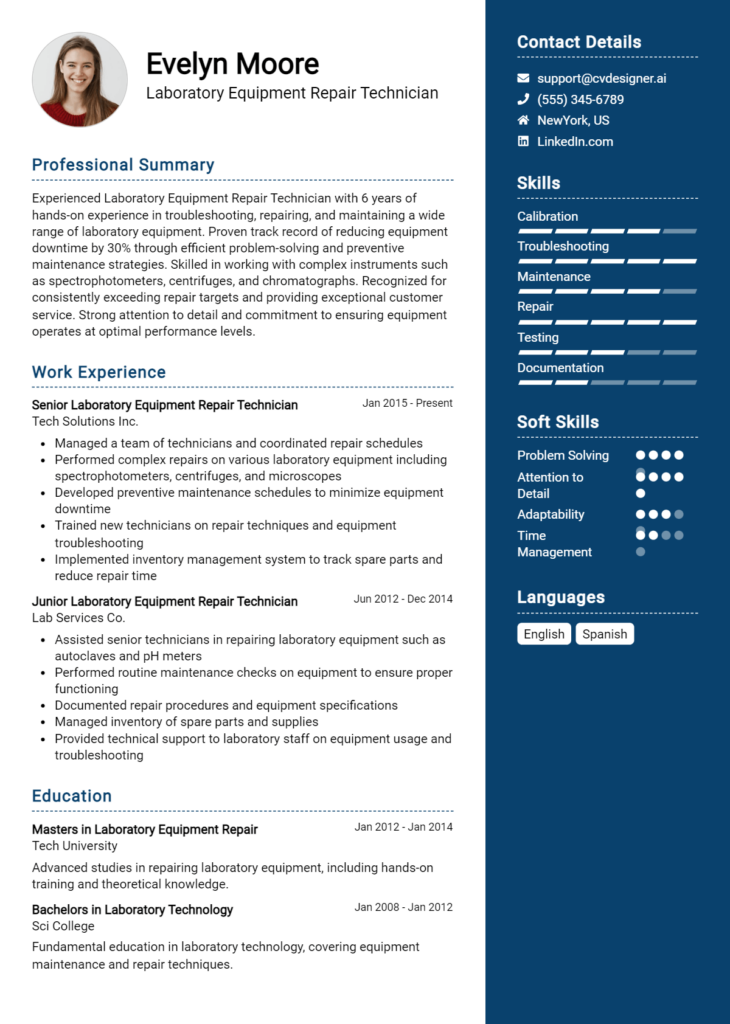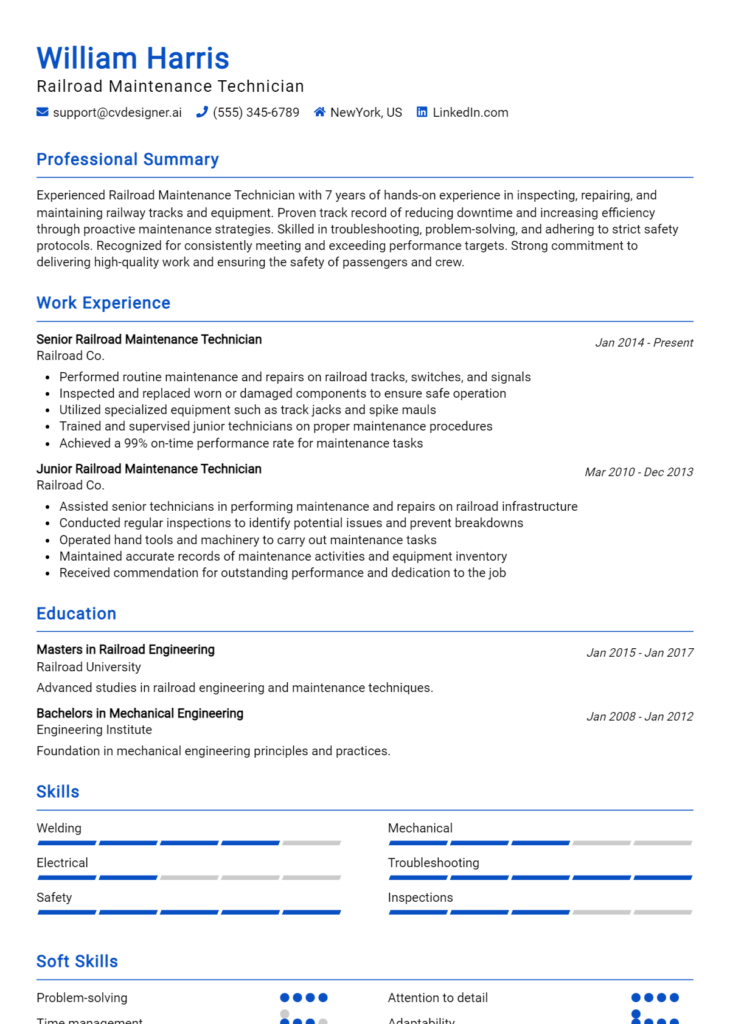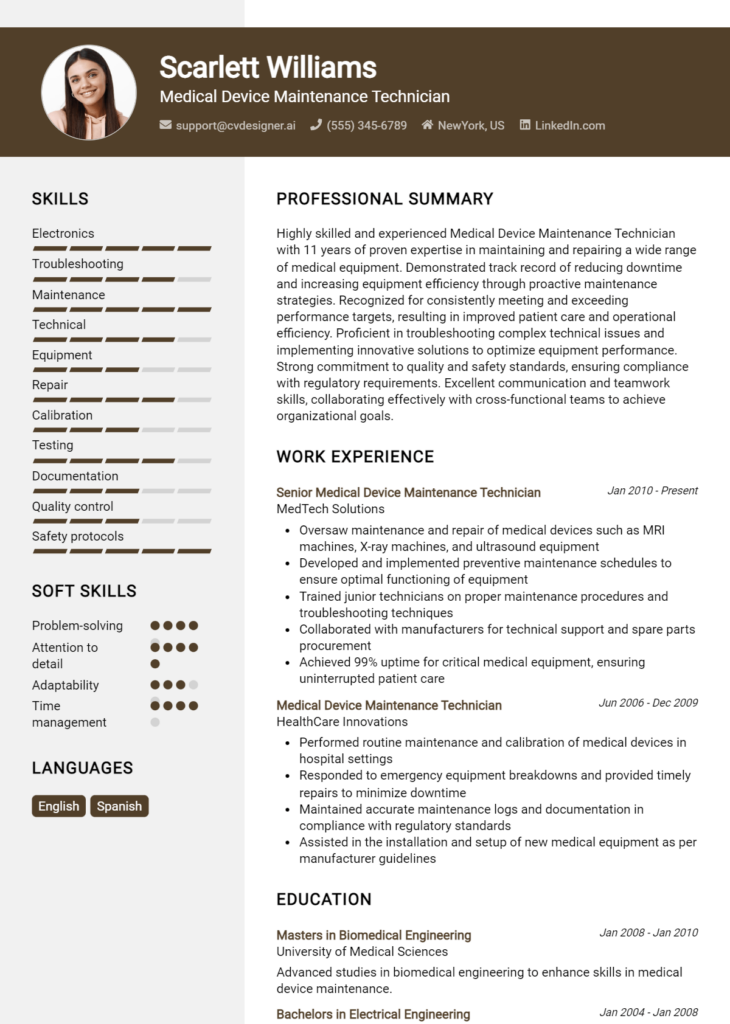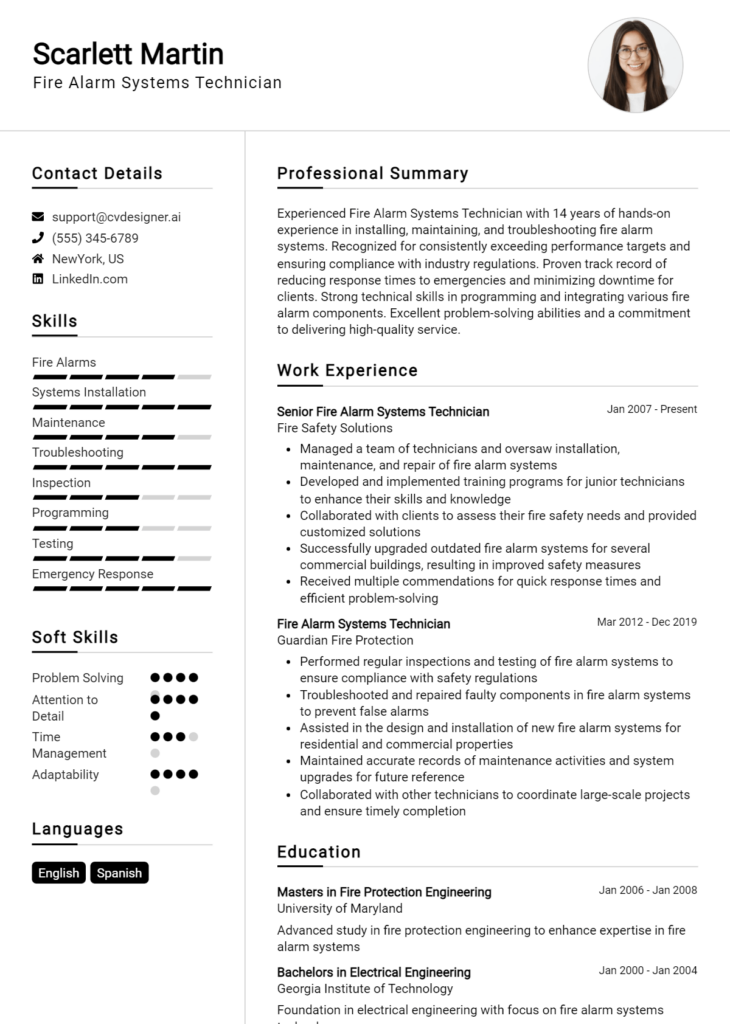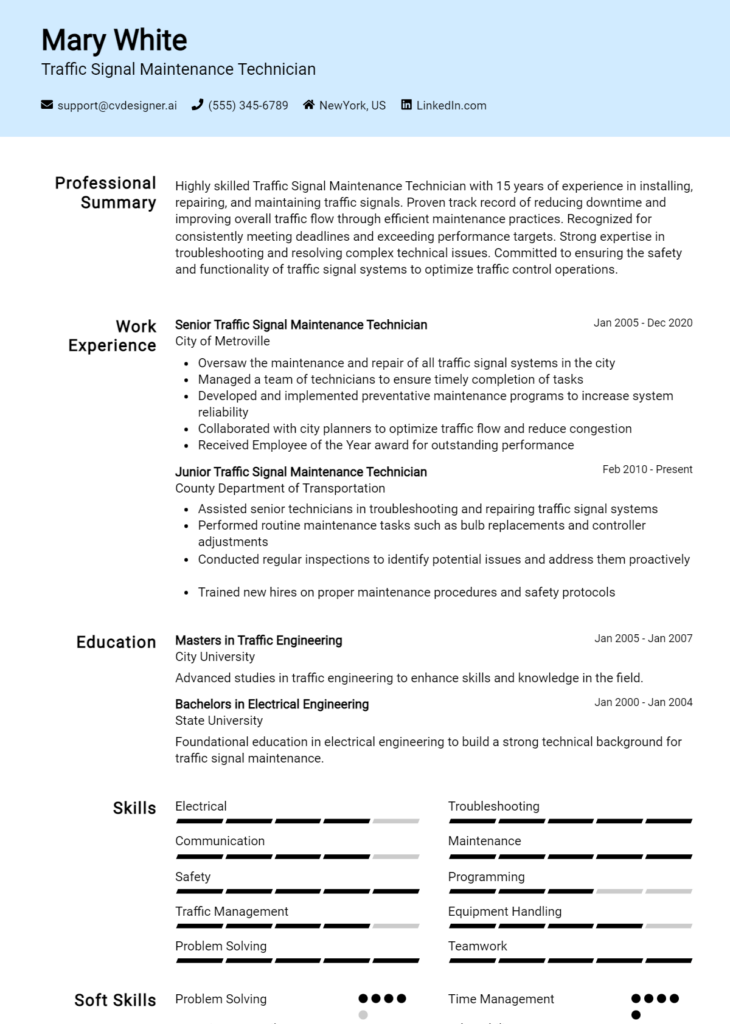Biomedical Equipment Technician Core Responsibilities
A Biomedical Equipment Technician (BMET) plays a crucial role in ensuring the functionality and safety of medical devices across healthcare settings. Key responsibilities include installing, maintaining, and repairing biomedical equipment, collaborating with clinical staff to understand their needs, and conducting regular inspections to meet regulatory standards. This role requires strong technical knowledge, operational expertise, and adept problem-solving skills to efficiently address equipment malfunctions. A well-structured resume that highlights these competencies can effectively showcase a technician's ability to contribute to overall organizational goals.
Common Responsibilities Listed on Biomedical Equipment Technician Resume
- Perform routine maintenance and calibration of medical equipment.
- Diagnose and repair malfunctioning biomedical devices.
- Document service and maintenance activities for compliance.
- Train healthcare staff on proper equipment usage.
- Assist in the procurement of new medical devices.
- Collaborate with other departments for equipment planning.
- Ensure compliance with safety and regulatory standards.
- Conduct equipment inventory and asset management.
- Provide technical support for medical device issues.
- Participate in developing equipment maintenance protocols.
- Stay updated on emerging medical technologies and trends.
- Implement cost-effective solutions for equipment management.
High-Level Resume Tips for Biomedical Equipment Technician Professionals
In the competitive field of biomedical equipment technology, a well-crafted resume is essential for making a strong first impression on potential employers. As the initial gateway to your professional capabilities, your resume must succinctly showcase both your technical skills and notable achievements in the industry. An effective resume not only highlights your qualifications but also conveys your passion for ensuring the reliability and safety of medical devices. This guide will provide practical and actionable resume tips specifically tailored for Biomedical Equipment Technician professionals, empowering you to create a document that stands out in the job market.
Top Resume Tips for Biomedical Equipment Technician Professionals
- Tailor your resume to each job description by incorporating keywords and phrases that align with the specific requirements of the position.
- Highlight relevant experience, especially roles that involved the maintenance, repair, and calibration of medical equipment.
- Quantify your achievements by using metrics to demonstrate your impact, such as reducing equipment downtime by a certain percentage.
- Showcase industry-specific skills, including knowledge of electrical systems, electronics, and software related to medical devices.
- Include certifications and training, such as CBET (Certified Biomedical Equipment Technician) or other relevant qualifications.
- Utilize a clear and professional format, ensuring that your resume is easy to read and visually appealing.
- Incorporate soft skills that are crucial for the role, such as problem-solving, communication, and teamwork abilities.
- List any relevant internships or volunteer work that demonstrates your hands-on experience in the biomedical field.
- Keep your resume concise, aiming for one page if you have less than 10 years of experience, while still providing enough detail to showcase your qualifications.
By implementing these tips, you can significantly enhance your resume's effectiveness, thereby increasing your chances of landing a job in the Biomedical Equipment Technician field. A well-structured and targeted resume not only showcases your expertise but also reflects your commitment to excellence in maintaining critical medical equipment, making you a standout candidate to potential employers.
Why Resume Headlines & Titles are Important for Biomedical Equipment Technician
In the competitive field of biomedical equipment technology, a resume headline or title serves as a critical first impression for job seekers. A well-crafted headline can instantly capture the attention of hiring managers by summarizing a candidate's key qualifications and expertise in one impactful phrase. This concise and relevant statement should directly relate to the job being applied for, highlighting specific skills or accomplishments that set the candidate apart from others. By establishing a strong headline, candidates can effectively communicate their value and encourage employers to delve deeper into their resumes.
Best Practices for Crafting Resume Headlines for Biomedical Equipment Technician
- Keep it concise: Aim for one impactful sentence that encapsulates your qualifications.
- Be role-specific: Tailor your headline to reflect the specific position of Biomedical Equipment Technician.
- Highlight key skills: Include essential technical skills or certifications relevant to the role.
- Use action-oriented language: Employ strong verbs that convey your capabilities and achievements.
- Avoid jargon: Ensure your headline is easily understandable, even to non-technical hiring managers.
- Showcase experience: If possible, incorporate years of experience to establish credibility.
- Make it relevant: Align your headline with the job description to demonstrate you are a perfect fit.
- Use keywords: Incorporate industry-specific terms to improve visibility in applicant tracking systems.
Example Resume Headlines for Biomedical Equipment Technician
Strong Resume Headlines
Certified Biomedical Equipment Technician with 5+ Years of Experience in Hospital Equipment Maintenance
Detail-Oriented Biomedical Technician Specializing in Preventative Maintenance and Troubleshooting
Expert in Medical Device Calibration and Repair with Proven Record of Reducing Downtime
Dedicated Biomedical Equipment Specialist Committed to Enhancing Patient Care Through Equipment Innovation
Weak Resume Headlines
Just Another Technician Seeking a Job
Experienced Worker in Medical Field
Looking for Opportunities in Healthcare
The strong headlines are effective because they are specific, highlight relevant skills, and convey a sense of professionalism and expertise that resonates with hiring managers. They provide a clear snapshot of the candidate's qualifications and focus on the value they bring to the role. In contrast, the weak headlines fail to impress due to their vagueness and lack of distinctiveness, making it difficult for employers to see what unique attributes the candidate possesses or how they align with the job at hand.
Writing an Exceptional Biomedical Equipment Technician Resume Summary
A well-crafted resume summary is essential for Biomedical Equipment Technicians as it serves as the candidate's first impression on hiring managers. A strong summary quickly captures attention by succinctly showcasing key skills, relevant experience, and notable accomplishments that align with the job role. It should be concise and impactful, providing a snapshot of the technician's qualifications while being tailored to the specific position being applied for. This strategic approach can significantly increase the chances of being noticed in a competitive job market.
Best Practices for Writing a Biomedical Equipment Technician Resume Summary
- Quantify Achievements: Use numbers and statistics to demonstrate your impact and effectiveness, such as the number of devices maintained or improved response times.
- Focus on Skills: Highlight technical skills relevant to biomedical equipment, including troubleshooting, maintenance, and regulatory compliance.
- Tailor Your Summary: Customize your summary for each job application, incorporating keywords from the job description to align with the employer's needs.
- Showcase Relevant Experience: Mention specific roles or projects that are directly related to the biomedical equipment technician position.
- Use Action Verbs: Start sentences with strong action verbs to convey a sense of proactivity and achievement.
- Keep it Concise: Aim for 3-5 sentences that deliver a punch without overwhelming the reader.
- Highlight Certifications: If applicable, include relevant certifications or training that enhance your credibility in the field.
- Convey Passion: Express enthusiasm for the role and the impact of biomedical technology on patient care, which can help differentiate you from other candidates.
Example Biomedical Equipment Technician Resume Summaries
Strong Resume Summaries
Detail-oriented Biomedical Equipment Technician with over 8 years of experience in maintaining and repairing medical devices. Reduced equipment downtime by 30% through implementation of a proactive maintenance schedule. Certified in biomedical equipment technology and proficient in managing compliance with FDA regulations.
Results-driven Biomedical Equipment Technician skilled in troubleshooting and servicing a wide range of clinical equipment. Successfully trained and led a team of 5 technicians, improving service response times by 40% within one year. Committed to enhancing patient safety and operational efficiency.
Certified Biomedical Equipment Technician with a history of managing over 200 medical devices in a high-demand hospital setting. Achieved a 20% increase in equipment reliability through effective risk management and preventative maintenance programs. Strong background in electronic and mechanical repairs.
Weak Resume Summaries
Experienced technician looking for a position in healthcare technology. I have worked with various devices.
Biomedical Equipment Technician with some experience in the field. I am a hard worker and hope to contribute to a healthcare team.
The strong resume summaries are considered effective because they provide specific details about skills, accomplishments, and quantifiable outcomes that demonstrate the candidate's capabilities. They are tailored to the position and use industry-specific language that resonates with hiring managers. In contrast, the weak summaries are vague and lack detail, giving no real insight into the candidate's qualifications or the value they could bring to the role.
Work Experience Section for Biomedical Equipment Technician Resume
The work experience section of a Biomedical Equipment Technician resume is vital as it serves as a testament to the candidate's practical application of technical skills and their ability to contribute effectively to healthcare teams. This section not only showcases the technician's proficiency in maintaining and repairing medical equipment but also highlights their capability to manage teams and ensure the delivery of high-quality products in a fast-paced environment. By quantifying achievements and aligning experiences with industry standards, candidates can demonstrate their value to potential employers and illustrate their readiness to tackle the challenges of the role.
Best Practices for Biomedical Equipment Technician Work Experience
- Focus on quantifiable results, such as the number of devices repaired or downtime reduced.
- Highlight specific technical skills, including familiarity with various medical equipment and technologies.
- Emphasize collaboration with healthcare professionals and team members to improve operational efficiency.
- Use action verbs to convey a sense of initiative and responsibility in previous roles.
- Align work experience with industry standards and regulations to show compliance and expertise.
- Include certifications and training relevant to biomedical equipment maintenance and repair.
- Showcase problem-solving abilities by detailing challenging situations and successful resolutions.
- Tailor the work experience section to the job description, emphasizing relevant experiences and skills.
Example Work Experiences for Biomedical Equipment Technician
Strong Experiences
- Successfully reduced equipment downtime by 30% through proactive maintenance schedules and staff training initiatives.
- Led a team of 5 technicians in the installation and calibration of over 200 medical devices in a new hospital wing, ensuring compliance with all safety regulations.
- Implemented a tracking system for biomedical equipment repairs, resulting in a 25% increase in efficiency and a 15% reduction in repair costs over one year.
- Collaborated with nursing staff to identify equipment issues, leading to a 40% decrease in patient-reported equipment malfunctions.
Weak Experiences
- Responsible for repairing medical equipment.
- Assisted in the maintenance of devices.
- Worked with a team to handle equipment issues.
- Helped improve processes related to medical equipment.
The examples listed as strong experiences are considered effective because they provide concrete, quantifiable outcomes that showcase the candidate's impact on their previous workplace. They demonstrate leadership, technical expertise, and collaboration with healthcare professionals, which are critical for a Biomedical Equipment Technician. In contrast, the weak experiences lack specificity and measurable results, making it difficult for potential employers to assess the candidate's capabilities or contributions. Vague statements do not convey a clear picture of skills or achievements, reducing the overall impact of the resume.
Education and Certifications Section for Biomedical Equipment Technician Resume
The education and certifications section of a Biomedical Equipment Technician resume is crucial as it serves to showcase the candidate's academic background, industry-specific certifications, and commitment to ongoing professional development. This section not only highlights formal education relevant to the field, such as degrees in biomedical engineering or electronics, but also emphasizes specialized certifications that validate the technician's expertise. Including relevant coursework and training further enhances the candidate's credibility, demonstrating a comprehensive understanding of the essential skills and knowledge required in this technical role. By showcasing their educational achievements and continuous learning efforts, candidates can effectively align themselves with the expectations of potential employers in the healthcare technology sector.
Best Practices for Biomedical Equipment Technician Education and Certifications
- Include degrees from accredited institutions relevant to biomedical technology or engineering.
- List industry-recognized certifications such as CBET (Certified Biomedical Equipment Technician) or CRES (Certified Radiology Equipment Specialist).
- Provide details of relevant coursework that demonstrates specific skills or knowledge applicable to the role.
- Highlight any specialized training programs completed, including workshops or seminars.
- Keep the section concise but informative, focusing on the most pertinent qualifications.
- Use clear formatting to enhance readability, such as bullet points or tables for certifications.
- Update the section regularly to reflect new certifications or courses completed.
- Prioritize certifications that are required or preferred by the specific employers you're targeting.
Example Education and Certifications for Biomedical Equipment Technician
Strong Examples
- Bachelor of Science in Biomedical Engineering, University of Health Sciences, 2021
- Certified Biomedical Equipment Technician (CBET), 2022
- Relevant Coursework: Medical Device Technology, Electronics for Biomedical Applications, and Health Care Systems Management
- Certificate in Medical Equipment Maintenance, National Association for Biomedical Equipment Technicians, 2020
Weak Examples
- Associate Degree in General Studies, Community College, 2019
- Certification in Computer Repair, 2018
- Basic First Aid Training (non-industry specific), 2021
- High School Diploma, Graduated 2015
The examples provided are considered strong because they reflect relevant academic qualifications and certifications that directly apply to the Biomedical Equipment Technician role. They demonstrate a focused education and specialized training that align with industry standards. In contrast, the weak examples are less relevant, either due to their general nature or lack of direct application to the biomedical field, which diminishes their value in showcasing the candidate's qualifications for the position.
Top Skills & Keywords for Biomedical Equipment Technician Resume
In the competitive field of biomedical equipment technology, a well-crafted resume is vital for standing out to potential employers. Highlighting key skills is essential as they demonstrate your technical proficiency and interpersonal abilities, which are critical for success in this role. A Biomedical Equipment Technician (BMET) must not only possess the technical know-how to repair and maintain complex medical devices but also exhibit strong communication and problem-solving skills. The right combination of hard and soft skills can significantly enhance your resume and provide a clearer picture of your capabilities to prospective employers.
Top Hard & Soft Skills for Biomedical Equipment Technician
Soft Skills
- Attention to Detail
- Problem-Solving
- Communication Skills
- Teamwork and Collaboration
- Time Management
- Adaptability
- Critical Thinking
- Customer Service Orientation
- Interpersonal Skills
- Organizational Skills
- Initiative and Proactivity
- Stress Management
- Empathy
- Conflict Resolution
- Active Listening
- Analytical Thinking
Hard Skills
- Medical Equipment Calibration
- Troubleshooting and Repair
- Preventive Maintenance
- Technical Documentation
- Compliance with Safety Standards
- Electronic Circuitry Knowledge
- Computer Networking
- Equipment Inventory Management
- Knowledge of Regulatory Requirements
- Software Proficiency (e.g., CMMS)
- Biomedical Instrumentation
- Electrical and Mechanical Systems
- Installation of Medical Devices
- Quality Assurance Testing
- Data Analysis and Interpretation
- Proficiency in Diagnostic Tools
- Familiarity with Imaging Equipment
By incorporating these skills into your resume, along with relevant work experience, you can create a compelling narrative that showcases your qualifications as a Biomedical Equipment Technician.
Stand Out with a Winning Biomedical Equipment Technician Cover Letter
I am writing to express my interest in the Biomedical Equipment Technician position at [Company Name], as advertised on [Job Board/Website]. With a strong background in biomedical engineering and hands-on experience in maintaining, repairing, and calibrating medical devices, I am excited about the opportunity to contribute to your esteemed team. My dedication to ensuring the reliability and safety of medical equipment aligns seamlessly with your organization's commitment to providing high-quality healthcare solutions.
In my previous role at [Previous Employer], I successfully managed the maintenance of a diverse range of medical equipment, including imaging devices, infusion pumps, and patient monitoring systems. My responsibilities included conducting regular inspections and preventive maintenance, troubleshooting equipment malfunctions, and collaborating with medical staff to address their operational needs. I am particularly proud of a project where I led a team in reducing equipment downtime by 30% through the implementation of a more efficient maintenance schedule, which ultimately improved patient care delivery.
I hold a degree in Biomedical Engineering from [University Name], complemented by certifications from [Relevant Certifications], which have equipped me with the technical knowledge and practical skills essential for this role. My ability to communicate effectively with clinical and technical personnel ensures that I can translate complex technical issues into understandable terms, fostering a collaborative and proactive environment. I am also committed to staying updated with the latest advancements in medical technology, which enables me to provide the best support to your organization.
I am eager to bring my expertise in biomedical equipment maintenance and my passion for improving patient outcomes to [Company Name]. Thank you for considering my application. I look forward to the opportunity to discuss how my skills and experiences align with your needs and how I can contribute to your team.
Common Mistakes to Avoid in a Biomedical Equipment Technician Resume
Crafting a compelling resume as a Biomedical Equipment Technician (BMET) is essential to stand out in a competitive job market. However, many applicants make common mistakes that can hinder their chances of landing an interview. Avoiding these pitfalls can greatly enhance the effectiveness of your resume and help showcase your qualifications and experience more effectively.
Neglecting Technical Skills: Failing to highlight relevant technical skills specific to biomedical equipment can make your resume less impactful. Ensure you list proficiencies in equipment maintenance, calibration, and troubleshooting.
Using Generic Job Descriptions: Copying and pasting job descriptions from previous roles without tailoring them to your accomplishments can weaken your resume. Focus on what you achieved and how you contributed to your team's success.
Omitting Certifications: Biomedical Equipment Technicians often hold important certifications, such as CBET or CRES. Not including these can be a missed opportunity to demonstrate your qualifications and commitment to the field.
Lack of Quantifiable Achievements: Stating responsibilities without quantifying achievements can leave hiring managers unimpressed. Use metrics and specific examples to illustrate your impact, such as reducing downtime by a certain percentage.
Ignoring Industry Keywords: Not incorporating industry-specific keywords can result in your resume being overlooked by Applicant Tracking Systems (ATS). Research job postings to identify and include relevant terms and phrases.
Poor Formatting and Layout: A cluttered or unprofessional resume format can distract from your qualifications. Opt for a clean, organized layout that enhances readability and ensures that key information stands out.
Typos and Grammatical Errors: Spelling and grammatical mistakes can undermine your professionalism. Always proofread your resume multiple times and consider having someone else review it to catch any errors.
Failing to Update Regularly: An outdated resume can reflect poorly on your current skills and experiences. Regularly updating your resume to include recent roles, skills, and achievements is crucial for presenting yourself accurately to potential employers.
Conclusion
As a Biomedical Equipment Technician, your expertise plays a critical role in maintaining and repairing medical devices that are essential for patient care. Throughout this article, we have covered the key responsibilities of the role, including troubleshooting equipment malfunctions, performing regular maintenance, ensuring compliance with safety regulations, and collaborating with healthcare professionals. Additionally, the importance of staying updated with the latest technology and industry standards was emphasized, as well as the value of obtaining relevant certifications that can enhance your qualifications.
In conclusion, now is the perfect time to review and improve your Biomedical Equipment Technician resume to ensure it reflects your skills and experience effectively. Utilize available resources to help you stand out in a competitive job market. Check out the diverse resume templates and resume examples to find inspiration for your own document. If you're looking for a more tailored approach, consider using our resume builder to create a polished and professional resume. Don't forget the importance of a compelling cover letter—explore our cover letter templates to make a strong first impression.
Take action today to enhance your resume and pave the way for your next career opportunity as a Biomedical Equipment Technician!

